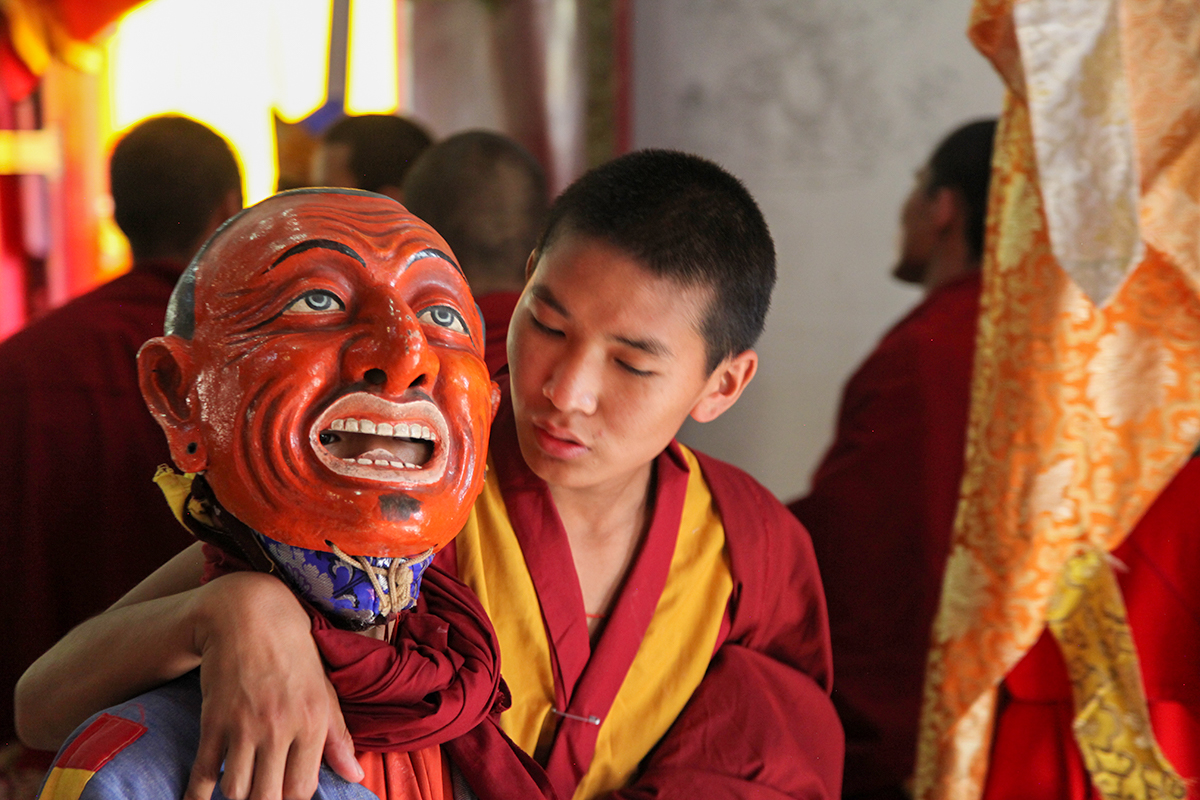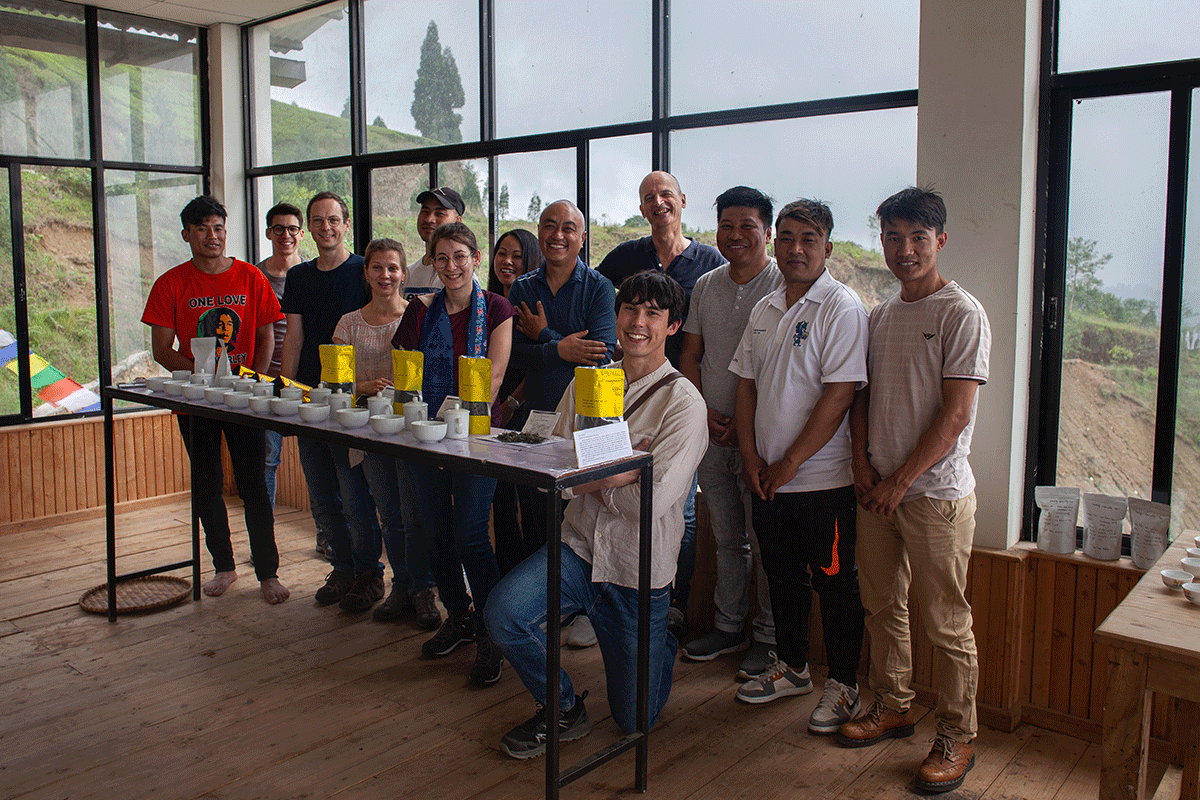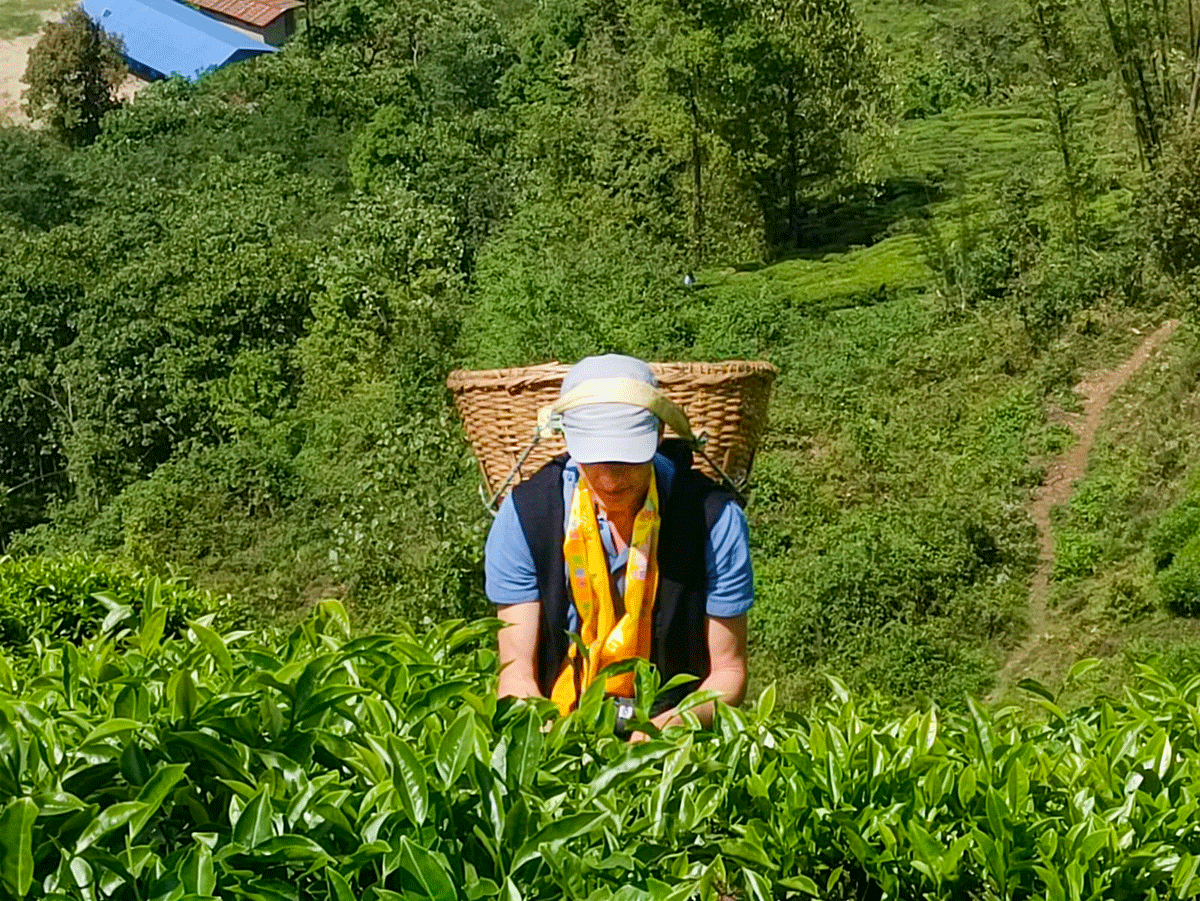Tea doesn’t have to be grown on vast plantations that cover hundreds of acres. Tea is also grown on a more human scale. Take this house surrounded by Camellia sinensis plants, for example. In many countries, tea cultivation has led to intensive farming practices, typically in lowland areas. However, if you climb a little higher, travel further and finish your journey on foot, you will find villagers who grow tea alongside other crops. These farmers use traditional methods to produce remarkable teas. Sometimes they sell the fresh leaves to a neighbour with better equipment or to the local cooperative. Here, I feel a deep sense of serenity. By eight o’clock in the morning, the sun has been up for a while and the household is bustling. The crowing of the rooster mingles with the chanting of a mantra, and a sun salutation greets the new day.
Nepal
Sérénité
Nul besoin de plantations immenses, de domaines qui s’étendent sur des centaines d’hectares. Le thé c’est aussi cela, une maison entourée de camellia sinensis. Une production à échelle humaine. Dans de nombreux pays, la culture du thé a donné lieu à des pratiques intensives, en général en zone de plaine. Mais dès que l’on grimpe un peu, que l’on accepte de faire de la route, de finir à pied, on trouve des villageois qui cultivent le thé parmi d’autres matières agricoles et ces fermiers-là, de la façon la plus artisanale qui soit, manufacturent des thés remarquables. Il leur arrive aussi de vendre les feuilles fraîches à un voisin mieux équipé ou encore à la coopérative locale. Ce que je ressens ici c’est une atmosphère de sérénité. À huit heures du matin, le soleil était levé depuis longtemps et la maisonnée s’activait. Au chant du coq se mêlait celui d’un mantra, une salutation au soleil et à la vie.
Drink your soup!
When you take part in a professional tasting, you assess the dry leaf, the infused leaves and the liquid in the cup, known as the liquor or “soup”. This last name seems particularly appropriate when it is tasted with a spoon similar to those used in Asia to drink the broth served at the start of a meal. You bring the spoon of tea soup to your lips and slurp. Inhaling air at the same time allows you to better appreciate the texture, flavours and aromas of the liquor.
The experience of plucking tea
To understand tea and how it’s made, there’s nothing like experiencing it first hand, starting with plucking, when the young leaves are selected for processing. It’s only by doing it yourself that you can truly appreciate the precision, care and difficulty involved in every stage of making a tea, especially one of premium quality.
Here in Kalapani (Nepal), Céline, who manages the entire supply chain for Palais des Thés, is being shown how to pluck tea, and is concentrating on picking the bud and the top two leaves from each shoot that has reached the desired stage of growth.
Thinking of our friends
In Nepal, the torrential rains have caused significant damage. Our thoughts are with all those affected. It is often the poorest who lose the most.
Fortunately, our friends the tea farmers are rarely at risk from overflowing rivers. Tea grows on higher ground and does better on mountain slopes than down in the valleys where the soil is too wet for Camellia sinensis. But after a particularly heavy monsoon, landslides can sweep away roads, homes and lives. Entire mountainsides can collapse in a mudslide, causing many casualties.
Nepal is one of the poorest countries in the world. Not only is it subject to severe flooding, it also suffers some of the worst earthquakes. All the more reason to remember our friends in this ancient Himalayan kingdom, home to many remarkable small tea producers. They depend on us for their livelihood. So let’s brew a cup of one of their delicious teas and think of them, each in our own way.
To be human
In Nepal, it is not the year 2023 but 2078, until April. Just a few days before the New Year, I was lucky enough to watch the sacred dances at Shechen monastery. Behind the scenes, the monks get ready. They each put on their costume. The boy plays the role of the jester. He and his companions will entertain the spectators and play tricks on them between dances. These atsaras remind us of our human condition. To be human: that is all I wish for us at the start of this new year.
Being Useful
When I buy certain teas I have a strong sense that we’re helping a community. I feel that the money paid for the remarkable work that goes into making a great tea will be shared fairly and won’t just benefit one individual. When I visit a plantation I often ask myself: if I pay twice as much for the tea here, who’ll get the money? In some cases I have an intuition that the money would only go to one person or a particular group of people and that the pickers themselves wouldn’t get any extra. In other places I feel certain that our gesture will be shared. That the whole village will be able to congratulate itself for having made such delicious teas and that every effort will be made to make more. And in these situations I have a strong sense of how we’re helping. Here in Nepal, the team from Palais des Thés is meeting the team at the Norling factory. You’re supporting the whole village when you buy their superb tea. (photo : Anna Galitzine)
The art of picking tea
When it comes to picking tea, you have to do it to understand it. It’s difficult to imagine what it feels like to stand for a whole day, sometimes on a steep slope, with a ten- or twenty-kilogram basket on your back. This basket is held in place by a strap across the forehead while the picker quickly plucks the bud and the two young leaves from every stem on the bush with their nimble fingers. The gesture has to be repeated thousands of times and the young shoots must be thrown over the shoulder with a certain dexterity to make sure they land in the basket. Here, yours truly is concentrating on the task. (Photo: Uday Yangya)
The trip of a lifetime
Part of my job involves taking those who help to promote tea with me on my research trips. Many of my colleagues have never seen a tea plant in real life, so it is both a pleasure and a duty to ask them to accompany me on a tour of the plantations. Last week I was in Ilam Valley with Anna, Cassandra, Svetlana, Clément, Pierre and Thomas. We went from one small producer to another, meeting extraordinary people and admiring breathtaking scenery. Together, we rolled the leaves we had picked ourselves, joined by Léo, who works with me, searching for the world’s finest teas. We wished each other a Happy New Year, because in this incredible country we had just entered the year 2079. What wonderful moments these are, what incredible discoveries. To travel to such remote regions is, in a way, the trip of a lifetime, and nothing makes me happier than sharing it, and giving others a glimpse of this extraordinary profession.
Discovering other cultures
One of the joys of being a tea researcher is the opportunity to discover other cultures. Here, during the Tsechu festival, the monks breathe life into the characters whose masks they wear for the procession or dance.



